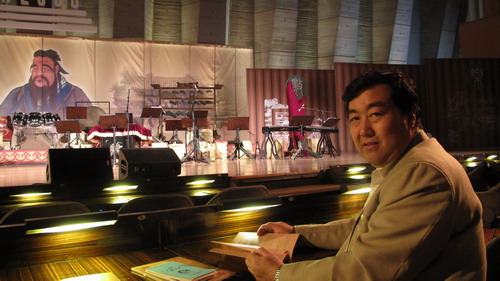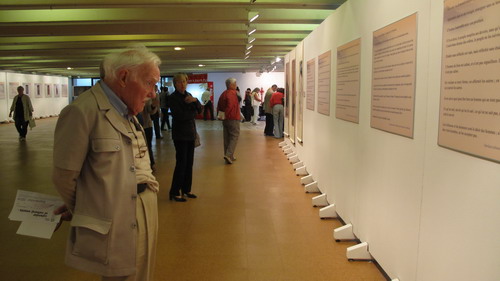Confucianism, age-old philosophy but still relevant
|
 Kong Xianglin, a 75th-generation descendant of Confucius, is pictured at a musical and dance event showing traditional Chinese rites to celebrate the ancient philosopher. Fu Jing/China Daily |
"Confucius devoted all his life to education until he passed away in 479 B.C. He has bequeathed us an achievement of inexhaustible wealth," a UN official said Monday.
Confucianism "can help people better understand the state of the world today" and also mirrors UNESCO's role in the world, Francesco Bandarin, the body's assistant director-general for culture, said in his inaugural speech for the Confucius Cultural Week at UNESCO's headquarters.
The event includes a lecture given by researcher Kong Xianglin on Confucius' life and general thoughts, an exhibition presenting his wisdom and experience, and a musical and dance event showing traditional Chinese rites to celebrate the ancient philosopher.
"I'm interested in the moral thinking of Confucius, even though it was a long time ago and some ideas were not fully developed ... I'm very interested in how we can apply it in our everyday life," a French student named Benjamin Ismail said after the lecture by Kong, a 75th generation descendant of Confucius.
It was the first time for Ismail to listen to Confucius' descendant since his interest in the old Chinese thinker was sparked four years ago, the same time when he began to learn Chinese.
Ismail said the value of Confucianism was to train people to be "ren" (benevolent). "To try to improve yourself everyday by learning and seeking knowledge, on which I really agree with Confucius," he said, waiting for Kong to autograph his French edition of Confucius' Analects.
|
 A visitor looks at an exhibition presenting Confucius' wisdom and experience. Fu Jing/China Daily |
Besides, other forms of Chinese folk art such as paper cutting, shadow play and gourd sculpting were also featured during the week-long cultural exchange event, attracting throngs of visitors.
Some crowded around the gourd sculptor, asking what the enchased gourd was used for; some peeped behind the shadow play screen to see the performer's tricks; others attentively watched artists making Chinese knots.
A visitor named Rosa Guerreiro said the sculpting reminded her of a similar handicraft in her native Brazil, and she was surprised and excited to see the Chinese artwork.
Former French prime minister Jean-Pierre Raffarin was among the attentive visitors at the opening ceremony of the cultural week. "I've known Confucius' thinking for 40 or 50 years," he told Xinhua proudly.
Raffarin said Confucianism places emphasis on harmony and balance, but "there are some important philosophers who have ignored the significance of Confucian thought."
Just as Bandarin said, one core thought of Confucianism agrees with UNESCO's principle that different races, cultures and religions could live in harmony and peace if the world adopts more comprehensiveness.
The week-long event in France also includes an award ceremony of the UNESCO Confucius Prize for Literacy on Wednesday to mark contributions made by the Nepali Non-Formal Education Center and the Egyptian Governorate of Ismailia.
Meanwhile, an international forum in Confucius' hometown Qufu, in China's eastern Shangdong province, will gather representatives and researchers to exchange their viewpoints on Confucianism, Chinese delegate Zhang Shuping said.
"Though his simple philosophy is over a thousand years old and very Chinese, the base is still relevant to modern society, so in this sense, it is valuable," Clerer Clare, a UNESCO clerk who visited the exhibition, said.


















